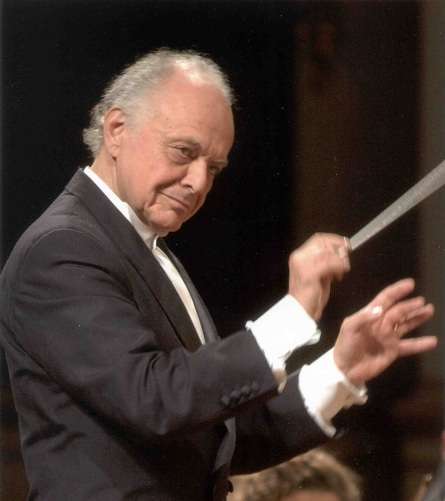|
Back
The Downside of Gravitas New York
Avery Fisher Hall, LIncoln Center
01/16/2013 - & January 17, 18, 19*, 2013
Johannes Brahms: Piano Concerto No. 1 in D Minor, Opus 15
Jean Sibelius: Symphony No. 2 in D Major, Opus 43
Yefim Bronfman (Pianist)
New York Philharmonic Orchestra, Lorin Maazel (Conductor) 
L. Maazel (© Courtesy of the Artist)
Gravitas does have its downside.
No double meaning implied here. Lorin Maazel, in a return to the podium which he held so well at the New York Philharmonic, gave a downbeat for the Brahms First Concerto that could have spelled doom. The theme can portend tragedy or triumph or passion, but its power should have the latent volcano energy to let the movement unfold without hindrance.
Mr. Maazel was certainly in the mood for tragedy, but the result was like the introduction to a Bruckner symphony, with dignified sounds from his orchestra, but something of a roadblock for soloist Yefim Bronfman.

Y. Bronfman (© Dario Acosta)
Wonderful as he was, Mr. Bronfman didn’t oppose the orchestral elements, but performed with all the stature and strength at his command. That piano entrance, so ethereal at the best of moments, was played with the utmost sensitivity, though it sounded a little out of place compared to the mood set by Mr. Maazel. For the remainer of this first movement, the pianist played with all the energy, brio and delight that he could muster. And that was considerable.
While a bit disconcerted by this opening, the Adagio was an all too brief jewel of intimate song. But when Mr. Bronfman started the Rondo, he was less the great artist than a cheetah who, after 30 minutes in a gilded cage, escaped and fled through the underbrush with the joy of freedom. There was no non troppo to the Allegro, but a Presto that zipped through the movement with glee and (dare I say it?) gratefulness that he could perform to his–and our–heart’s content.
No qualms about Lorin Maazel’s Sibelius. While the conductor is a master of every form, one feels that his true love is in this mighty Finn de Siècle Colossus of a work. While the 1902 symphony hardly sounds modern today, it was Sibelius’s way of proving that he was not simply a composer or anthems or theater music or one Late Romantic symphony, but a true master of the unconventional form.
Mr. Maazel conducted the D Major Symphony with intensity, broad climaxes, and a finale which, in its transition from minor to major key, almost shouted out exaltation.
Harry Rolnick
|